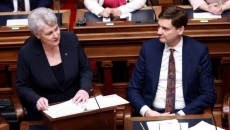Supervised consumption sites are just "drug dens" that a future Conservative government would not fund and seek to close, Pierre Poilievre said Friday.
During a visit to a park near such a site in Montreal, Poilievre said he would shutter all locations near schools, playgrounds and "anywhere else that they endanger the public."
"Radical bureaucrats don't have the right to open these drugs dens anywhere they want," he said.
LIVE: Shut down the drug den. Stop the crime. Treat addiction. https://t.co/suVf1ihhr2
— Pierre Poilievre (@PierrePoilievre) July 12, 2024
The first supervised injection site opened in Vancouver more than 20 years ago.
The sites are intended to try and prevent overdoses by allowing people to bring drugs to use under the observation of trained staff. They also provide access to clean supplies to reduce rates of HIV and other diseases.
Health Canada says more than 40,000 people have died from toxic drug deaths since 2016, when the agency began tracking these figures.
A 2011 Supreme Court ruling said that closing the Vancouver operation would deprive users of their Charter rights.
Poilievre said Friday that landmark decision does not mean supervised drug sites can operate anywhere without any restrictions.
He said he believes "reasonable restrictions" can be placed on them to prevent them from opening "in locations that endanger the community, or where there is community opposition."
Poilievre was a member of the Conservative government of Stephen Harper that passed the Respect for Communities Act following the Supreme Court's decision.
It required prospective supervised consumption sites to meet a suite of 26 criteria in order to open, such as tracking crime rates and providing medical evidence, along with handing in letters from provincial health ministers, local police and other stakeholders.
That law was panned by opposition parties and health groups for essentially blocking such sites from opening. They said it bogged down the application process with paperwork and created unnecessary barriers.
The Conservatives argued the law was needed to strike a balance between public health and public safety. Rona Ambrose, the health minister at the time, said their intention was to allow police and parents have their say before such sites could open in a neighbourhood.
After they were elected in 2015, the Liberals passed their own law allowing facilities to open with more ease, citing the need to better respond to the overdose crisis.
There are now 39 supervised consumption sites, according to Health Canada, and another 10 open applications.






